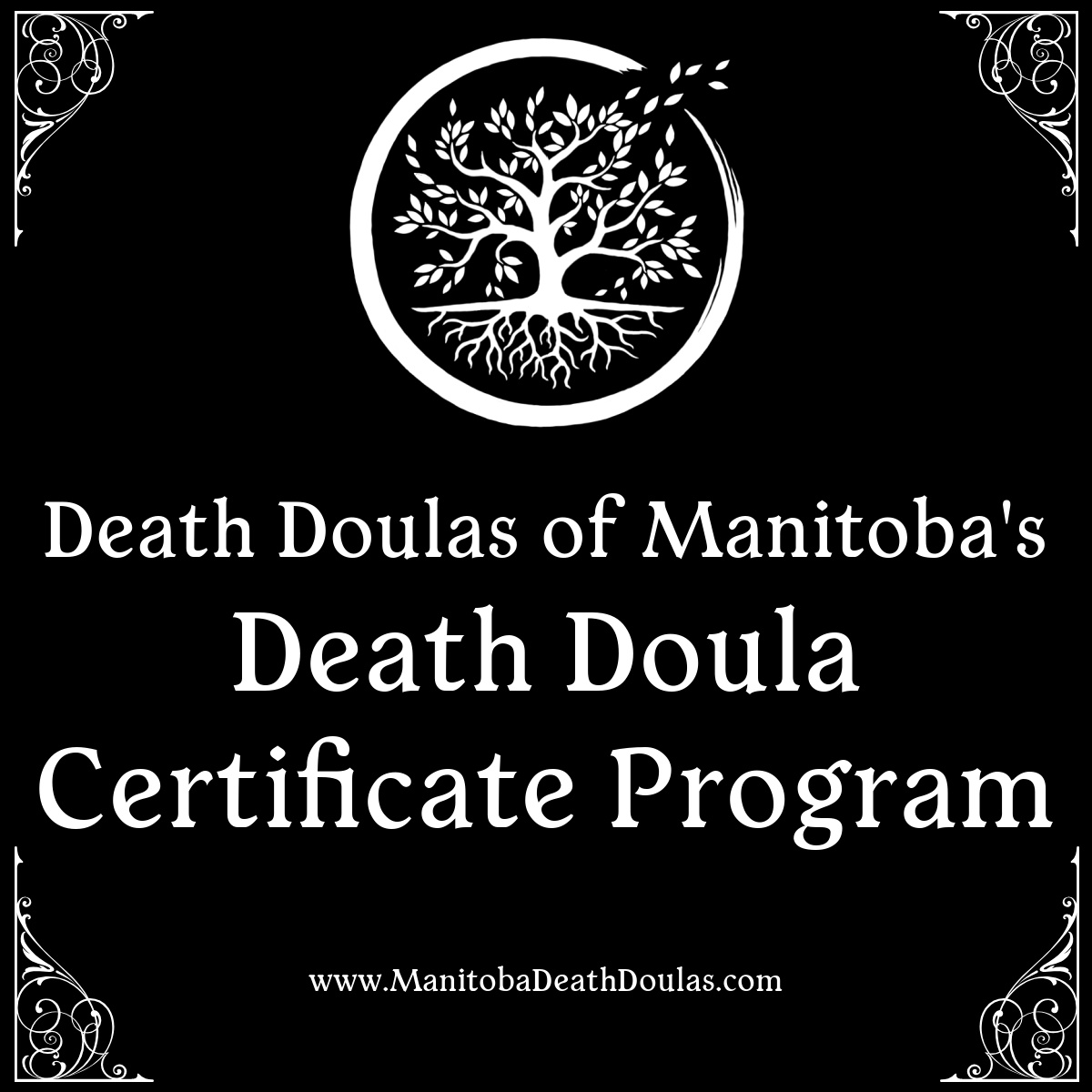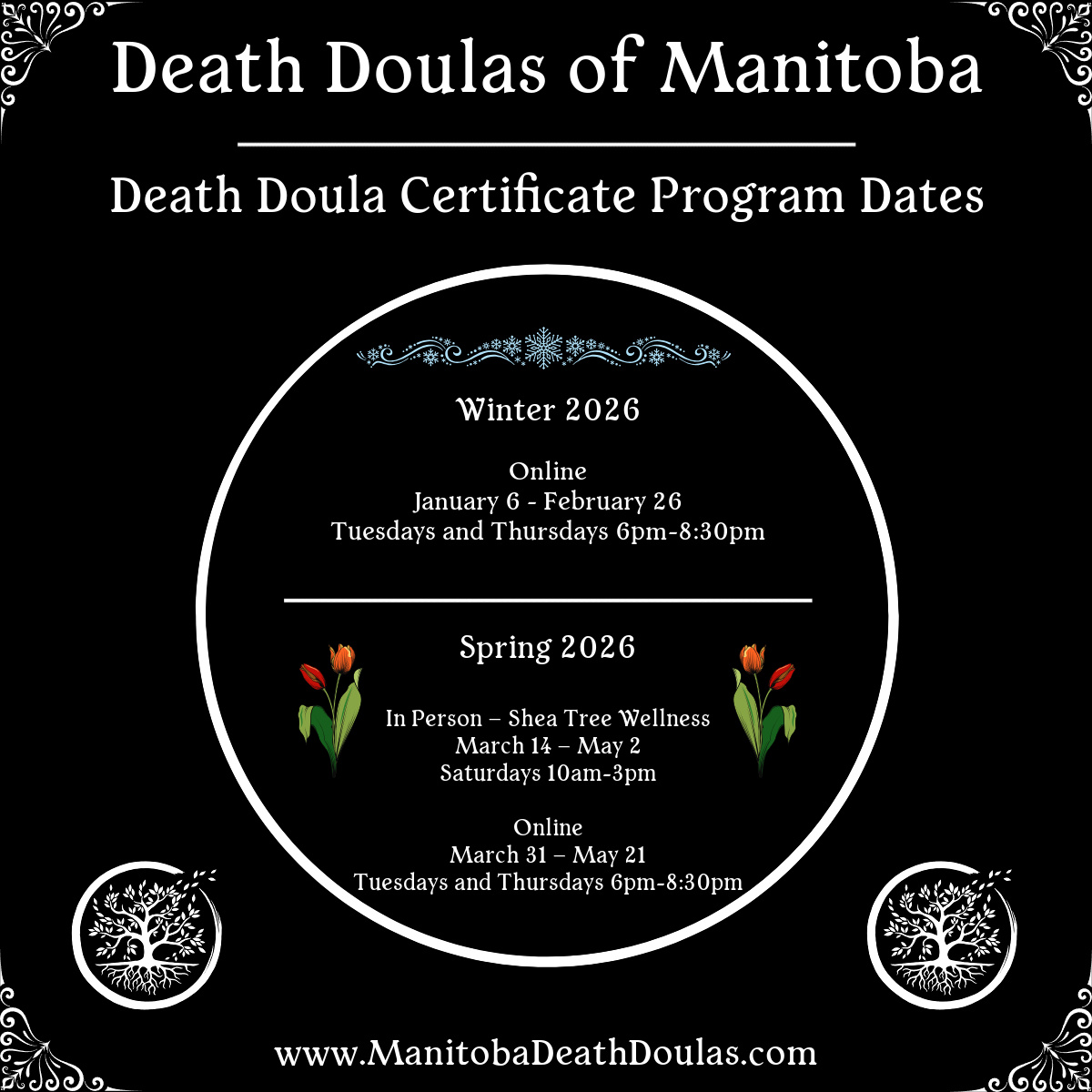
REGISTRATION IS OPEN FOR WINTER 2026
The session will take place online via Zoom from January 6 – February 26
*Pre-registration is open for Spring 2026.*
Email DeathDoulasOfManitoba@gmail.com to place your name on the waitlist.
Registration for the Winter session will begin on Monday, October 6th with an early registration price until November 30th. Spring 2026 Registration will begin on December 1st!
Course Investment: $600 Canadian (early registration pricing)
(does not include books)
Read the full registration document for payment plan options, refund policies,
and other important details!
REGISTER HERE
Class Outline
Class One
Introductions, Class Etiquette, and Class Outlines
Who is a Doula? Terminology and Definitions
Death Doula Do’s and Don’ts (Scope of Practice)
Death as a Sacred Transition
Class Two
Communication (having difficult conversations/speaking about illness, death, and dying/advocating for clients and empowering them to make informed decisions)
Final Wishes and Advance Care Plans
Ethics, Legal Information, and Standards of Practice
Book Study (“The Needs of the Dying: A Guide for Bringing Hope, Comfort, and Love to Life’s Final Chapter” by David Kessler)
Class Three
Alternative Practices and Non-Medical Pain Relief Options (Information about Reiki, Sound Healing, Palliative Massage, and more)
Cross Cultural Beliefs and Honouring Traditions
Supporting Difficult Situations (estrangement, distant relationships, challenging circumstances)
Book Study (“The Needs of the Dying: A Guide for Bringing Hope, Comfort, and Love to Life’s Final Chapter” by David Kessler)
Class Four
Weeks and Months Before Active Dying
MAiD Information and Statistics
Palliative Care and Hospice Information
Active Dying
Vigils
Book Study (“Finding Peace at the End of Life” by Henry Fersko-Weiss)
Class Five
Working with Other Professionals in Death Care
Death is Not an Emergency (what to do when someone dies at home and it is expected)
Introduction to Shrouding and Ceremony Practices
Funeral Guidelines and Information
Home Funerals
Book Study (“Finding Peace at the End of Life” by Henry Fersko-Weiss)
Class Six
What Doulas Can Do in the Days and Weeks After Death has Occurred
Grief and Bereavement
Therapy options
Resources to help support those who are grieving
Book Study “Final Gifts: Understanding the Special Awareness, Needs, and Communications of the Dying” by Maggie Callanan and Patricia Kelley
Class Seven
Guest Speakers (subject to change based on availability)
Palliative Manitoba – Volunteering and Compassionate Care Course information
Funeral Services – Information about cremation, options, open for Q & A
Palliative Care Professional – Realities of working in palliative care
Book Study and Group Exercises
Final Class Information and Assignment
Book Study “Final Gifts: Understanding the Special Awareness, Needs, and Communications of the Dying” by Maggie Callanan and Patricia Kelley
Class Eight
Review
How to Build a Business as a Death Doula
Community, Provincial, National, and Online Resources
Questions and Answers
Graduation Ceremony and Celebration
Mandatory Reading
“The Needs of the Dying: A Guide for Bringing Hope, Comfort, and Love to Life’s Final Chapter” by David Kessler
“Finding Peace at the End of Life” by Henry Fersko-Weiss
“Final Gifts: Understanding the Special Awareness, Needs, and Communications of the Dying” by Maggie Callanan and Patricia Kelley
There will be an additional option for an apprenticeship or a practicum to help emerging doulas gain real world training and experience. The details will be available as soon as possible for this, and depending on many factors, may not be available until the Spring of 2026.

Please watch this page for updates
or place your name on this list
to receive up to date information about the course.
Along with theory on a vast array of topics (advance care planning, how to support the dying and bereaved, legacy projects, alternative/holistic approaches to death and dying, ceremony and ritual, and so much more!) there will be a hands on approach to this learning, giving students the experience they need to begin offering their support and services to their communities.
